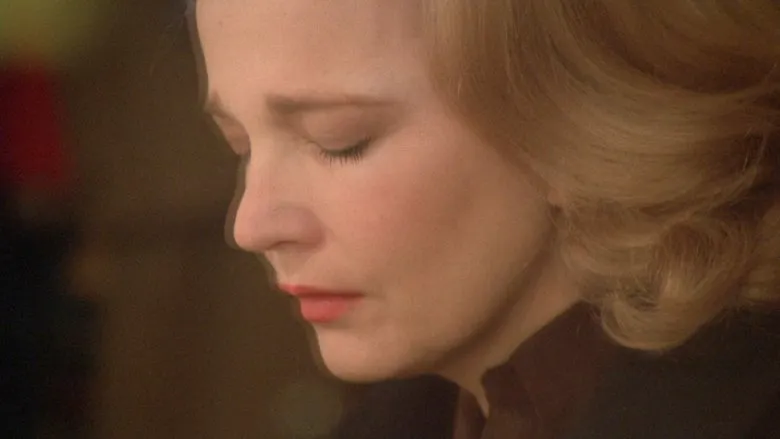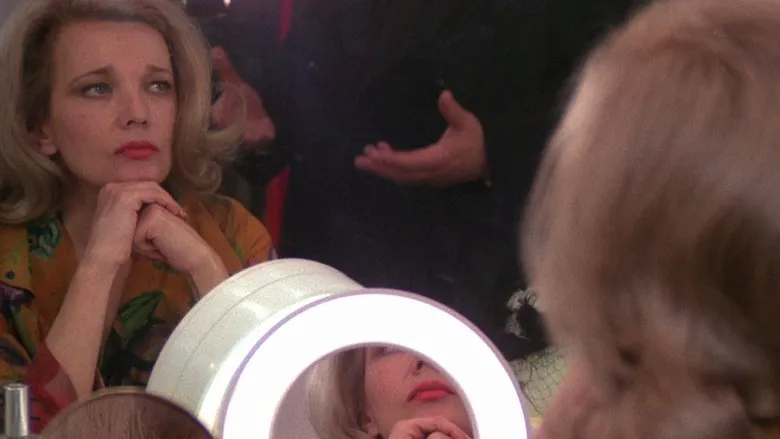A Profound Masterpiece: Gena Rowlands’ Tour de Force in “Opening Night”
John Cassavetes’ “Opening Night” stands as a monumental cinematic achievement, serving as an utterly magnificent and unflinching showcase for the unparalleled talents of Gena Rowlands. The film dives deep into the arduous journey of a woman grappling for authentic emotion on stage, revealing a process where no emotional stone is left unturned and all societal conventions are boldly disregarded in the pursuit of truth.
The narrative orbits around Myrtle Gordon, an acclaimed yet aging actress, who finds herself precariously balancing on the precipice of a severe nervous breakdown while rehearsing a pivotal new role. For Myrtle, the fundamental question of whether to embody her authentic self as a woman or strictly adhere to the rigid expectations of a prima donna isnère; this isn’t merely artistic choice, but a matter of existential survival, resonating as a life-or-death decision that permeates every fibre of her being.

Intense Pressures and Unvarnished Emotions Backstage
Despite a string of seemingly successful rehearsals in Los Angeles, Myrtle remains profoundly dissatisfied with the play itself, feeling disconnected from the character she is meant to portray. With the daunting New York premiere rapidly approaching, the stakes for everyone involved are pushed to an unbearable breaking point. This mounting pressure affects not only Myrtle but also the world around her: the director, visibly worn down and weary of life’s relentless demands; the aging producer, whose entire financial future is riding on the play’s success, clutching onto a fragile, almost naive hope that “everything will work out”; and the veteran playwright, who harbors a deep, personal connection to the role, having written it from a place deeply rooted in his own experiences.
Myrtle herself contributes significantly to this pervasive tension, outright refusing to accept an age-appropriate interpretation of her character, instead actively disrupting rehearsals in her pursuit of a deeper, more genuine connection. Each member of the team is perpetually on edge, haunted by the specter of catastrophic failure. Adding another layer of complexity, the co-star, having endured a truly humiliating and profoundly public affair with the volatile leading lady, cloaks himself in the protective facade of an indifferent, pragmatic artist—a transparent yet desperate defense mechanism against the relentless emotional and professional stress that threatens to consume them all.
Cassavetes’ Signature Style: The Unconventional Family Unit
The core theatrical team, anchored by the uncompromising and perpetually whiskey-sipping Myrtle, who staunchly refuses to embody any role that doesn’t feel viscerally authentic, mirrors the famously tumultuous yet intensely familial relationships often found within John Cassavetes’ own film crews. His method actors and collaborators frequently blurred lines between professional and personal, a dynamic exquisitely reflected here. Myrtle’s unwavering desire is to strip away every superficial layer and inaccurate performance on stage, rejecting the polished ‘tricks’ honed by years of craft or even the conventional dictates of the profession itself—those familiar clichés and comforting platitudes that often serve to placate both authors and audiences alike. She yearns for raw, unadorned truth.


Confronting Mortality and Embracing Authenticity
Above all, Myrtle’s most profound fear appears to be age itself. She desperately strives to portray this captivating, funny, beloved, and truly incredible woman as if age held no sway whatsoever, as if the relentless march of time were utterly irrelevant to the character’s essence. A tragic and accidental incident—the death of a young, adoring fan—serves as a devastating catalyst. Haunting the overstimulated Myrtle as an almost spectral presence, this event triggers a pre-premiere meltdown of epic proportions, yet paradoxically, it also aids the actress in her profound internal battle against herself. This harrowing experience helps her to confront and ultimately dismantle the suffocating grip of depression and the insidious ravages of time.
This arduous journey culminates not just in an artistic triumph on stage but, more significantly, a deeply personal and collective victory in her own life. Gena Rowlands, embodying Myrtle with breathtaking vulnerability and ferocity, demands from herself and her fellow performers the very same incandescent level of genuine, unfiltered experience that John Cassavetes passionately sought to capture on screen. Through this collaboration, a beautiful and bewildering blurring of lines occurs—between reality and imagination, between the woman and the actress, and ultimately, between the person behind the role and the complex vision of the director. “Opening Night” is not just a film; it’s an immersive and profoundly human experience that peels back the layers of performance, presenting the raw, beating heart of artistry and existence.